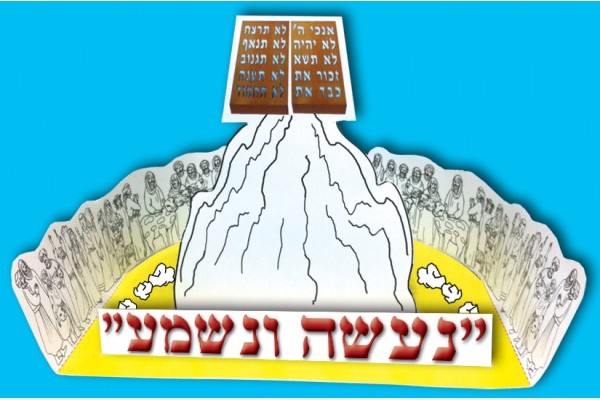“We will do first, and afterwards, understand” (Shemot 24:7)
(Much of the material in this section is adapted with permission, from Sefer HaTodaah of Rabbi Eliyahu Kitov)
The following are Midrashic comments on the somewhat rash declaration of faith and trust, cited above, by the People of Israel in Hashem:
 Rabbi Simai expounded: “When the People of Israel preceded “We will understand” by “We will do,” a Heavenly Voice was heard, saying, “Who revealed to my children this secret, which only the angels until now knew? as it is written (Psalms 103), ‘Praise Hashem, His Angels, Mighty in Strength, who Obey His Will, then Understand His Word’ – first obey, and afterwards, understand.”
Rabbi Simai expounded: “When the People of Israel preceded “We will understand” by “We will do,” a Heavenly Voice was heard, saying, “Who revealed to my children this secret, which only the angels until now knew? as it is written (Psalms 103), ‘Praise Hashem, His Angels, Mighty in Strength, who Obey His Will, then Understand His Word’ – first obey, and afterwards, understand.”
When the People of Israel preceded “We will understand” by “We will do,” six hundred thousand angels came to them and tied two crowns to each, one corresponding to “We will do,” the other to “We will understand.” But when the People sinned (by worshipping the Golden Calf), one hundred twenty thousand angels came down and removed the crowns.
“And they stood underneath the mountain” (Shemot 19); Rabbi Abdimi bar Chama said, “This teaches that the Holy One held the mountain over their heads, like a pot, and said to them, ‘If you accept the Torah, good! But if not – here will be your graves!’ “
(Even though they had already said that they would accept first, then understand? – only to emphasize that once they accepted, they would not be allowed to back away from their acceptance!)
Comment: The description of Hashem as “holding the mountain over their head” is probably not meant to be taken literally. Rather, it should be understood as a warning that the only reason the Jewish People were living, in a sense, outside the normal historical rules, which would normally pronounce a verdict of oblivion on a relatively small nation, was their acceptance of G-d’s rules; namely, that they would live by the lifestyle of the Torah. If they would attempt to abandon that commitment, Hashem would withdraw, at least temporarily, His protection.
